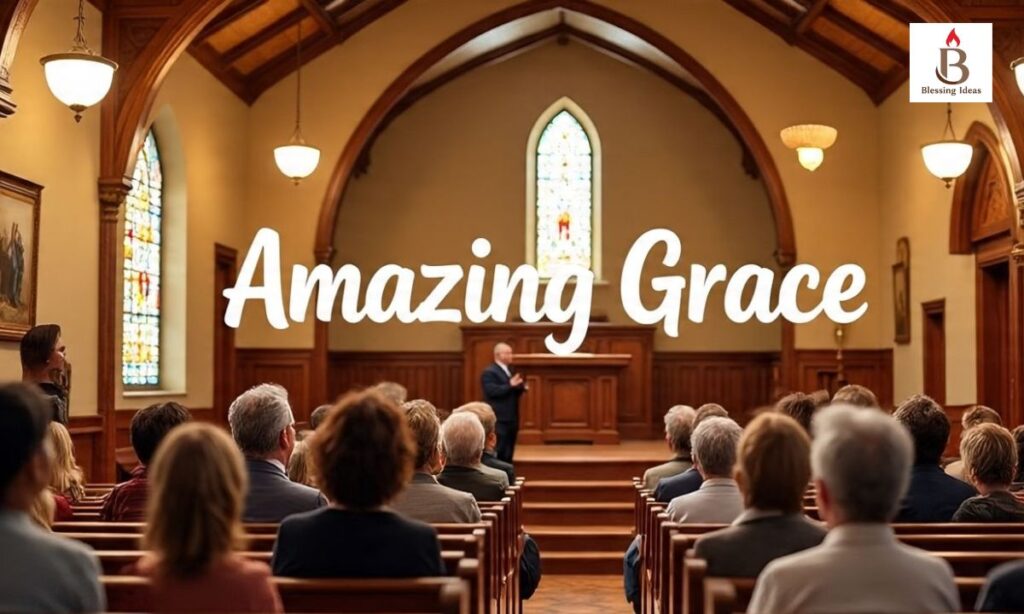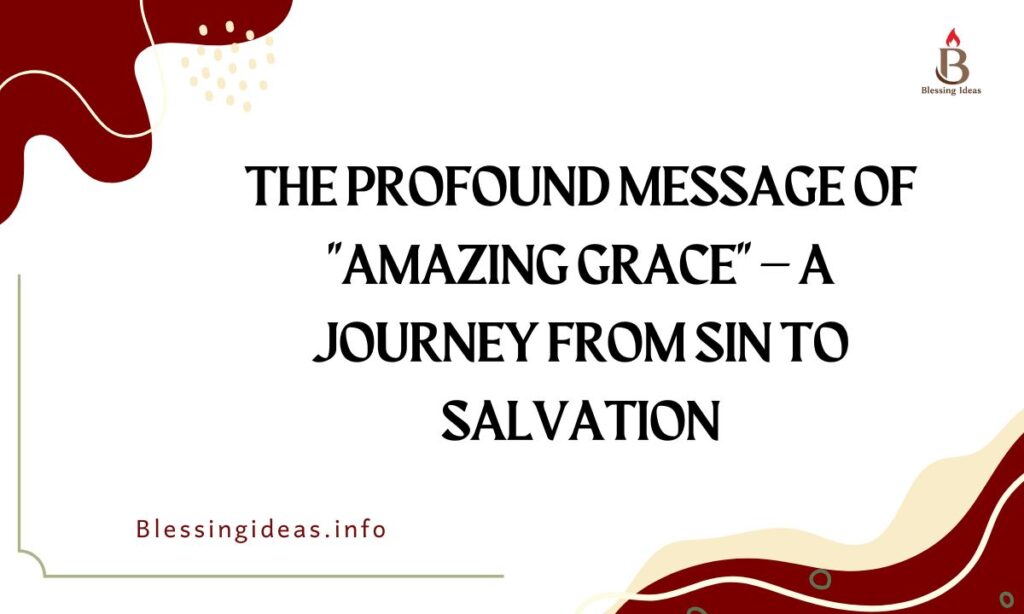Amazing Grace stands as one of the most beloved and powerful hymns in Christian history. Written by John Newton in 1772, this timeless song has touched millions of hearts across generations and cultures. The hymn’s enduring appeal lies not just in its beautiful melody, but in its profound message of redemption, transformation, and hope.
John Newton’s personal story makes this hymn even more remarkable. Born in 1725, Newton lived a life that seemed destined for destruction. His mother died when he was just seven years old, and he was raised by a distant stepmother. By age eleven, he had joined his father at sea, beginning a maritime career that would lead him into some of the darkest chapters of human history.
Verse 1: The Recognition of Need
Amazing grace (how sweet the sound)
that saved a wretch like me!
I once was lost, but now am found,
was blind, but now I see.
The opening verse immediately establishes the central theme of the hymn: the sweetness of grace that saves even the most hopeless sinner. Newton’s use of the word “wretch” is particularly striking. In his day, this word carried even stronger connotations than it does today, describing someone who is not merely unfortunate, but morally bankrupt and deserving of punishment.
Newton understood his condition before God. He was not simply making a mistake or going through a difficult phase. He recognized himself as fundamentally lost, separated from God by his own choices and actions. This acknowledgment is crucial to understanding grace—we cannot appreciate what we’ve been saved from until we recognize what we truly deserved.
The metaphor of blindness is particularly powerful in Newton’s story. John 9:25 records the words of a man healed by Jesus: “One thing I do know. I was blind but now I see!” Like this man, Newton experienced a spiritual sight that allowed him to see his condition clearly for the first time.
Being “lost” and “found” echoes Jesus’ parable of the lost sheep in Luke 15:3-7. The shepherd leaves ninety-nine sheep to search for the one that is lost. When he finds it, there is great rejoicing. Newton understood that he was that lost sheep, and God had come searching for him despite his unworthiness.
The phrase “how sweet the sound” suggests that grace is not just a theological concept but an experiential reality. Newton had heard this sound, felt this sweetness, experienced this transformation personally. Grace wasn’t theory to him—it was the most real thing in his life.
Verse 2: The Teaching of Grace
‘Twas grace that taught my heart to fear,
and grace my fears relieved;
how precious did that grace appear
the hour I first believed!
This verse reveals a profound theological truth: the same grace that saves us first convicts us of our need for salvation. Newton recognized that it was grace itself that opened his eyes to his spiritual danger. Without divine intervention, he would have continued in his blindness, unaware of his eternal peril.
The “fear” Newton describes is not mere anxiety but the appropriate reverence and concern that comes from understanding God’s holiness and our own sinfulness. Proverbs 9:10 tells us that “The fear of the Lord is the beginning of wisdom.” This healthy fear of God’s judgment created the foundation for Newton’s appreciation of grace.
Yet the same grace that produced this fear also relieved it. This is the beautiful paradox of the gospel: God’s law shows us our need, but God’s grace meets that need perfectly. Romans 8:1 proclaims, “Therefore, there is now no condemnation for those who are in Christ Jesus.”
Newton’s memory of “the hour I first believed” was crystal clear throughout his life. This wasn’t a gradual awakening but a specific moment when faith took hold of his heart. Many Christians can point to such a moment, though others experience a more gradual conversion. What matters is not the timing but the reality of the transformation.
The word “precious” indicates the immense value Newton placed on this experience. 1 Peter 2:7 speaks of Jesus as “precious to you who believe.” Grace becomes precious when we understand both what we deserved and what we received instead.
Verse 3: Grace Through Life’s Journey
Through many dangers, toils and snares
I have already come:
’tis grace has brought me safe thus far,
and grace will lead me home.
Newton’s life after conversion was not without challenges. He continued to face “dangers, toils and snares”—both external circumstances and internal struggles with sin. This verse acknowledges the ongoing reality of Christian life in a fallen world.
The “dangers” included literal perils of his maritime life, but also spiritual dangers that threatened his faith. “Toils” refers to the hard work and struggles of daily life, while “snares” suggests the temptations and traps that could derail his spiritual progress.
Newton recognized that his survival and progress were not due to his own strength or wisdom but to grace alone. Philippians 1:6 expresses this same confidence: “Being confident of this, that he who began a good work in you will carry it on to completion until the day of Christ Jesus.”
The phrase “safe thus far” acknowledges both God’s past faithfulness and present protection. Lamentations 3:22-23 reminds us that “Because of the Lord’s great love we are not consumed, for his compassions never fail. They are new every morning; great is your faithfulness.”
Looking forward, Newton expressed confidence that the same grace that had preserved him would “lead me home.” This reflects the biblical teaching of perseverance—that those whom God saves, he keeps. John 10:28-29 records Jesus’ promise: “I give them eternal life, and they shall never perish; no one will snatch them out of my hand. My Father, who has given them to me, is greater than all; no one can snatch them out of my Father’s hand.”
Verse 4: Divine Promises and Protection
The Lord has promised good to me,
his word my hope secures;
he will my shield and portion be
as long as life endures.
Newton’s confidence rested not on his feelings or circumstances but on God’s promises. The Lord had “promised good”—not necessarily ease or prosperity, but ultimately good outcomes for those who love him. Romans 8:28 declares, “And we know that in all things God works for the good of those who love him, who have been called according to his purpose.”
The phrase “his word my hope secures” emphasizes the foundational role of Scripture in Christian assurance. Hebrews 6:19 describes hope as “an anchor for the soul, firm and secure.” God’s word provides this anchor, giving believers something solid to hold onto when everything else seems uncertain.
The imagery of God as “shield” appears frequently in Scripture. Psalm 28:7 declares, “The Lord is my strength and my shield; my heart trusts in him, and he helps me.” A shield protects against enemy attacks, and Newton knew he faced spiritual enemies that sought his destruction.
God as “portion” suggests complete satisfaction and provision. Psalm 73:26 says, “My flesh and my heart may fail, but God is the strength of my heart and my portion forever.” While others might find their security in wealth, relationships, or achievements, Newton found his ultimate satisfaction in God himself.
The promise extends “as long as life endures,” acknowledging both the temporary nature of earthly life and God’s faithfulness throughout its duration. This wasn’t just a promise for good times but for all times—through illness, loss, disappointment, and every other trial life might bring.
Verse 5: Hope Beyond Death

Yes, when this flesh and heart shall fail,
and mortal life shall cease:
I shall possess, within the veil,
a life of joy and peace.
Newton faced the ultimate reality that all humans must confront: death. “This flesh and heart shall fail” acknowledges the temporary nature of our physical existence. No matter how healthy we are or how well we take care of ourselves, our bodies will eventually wear out.
The phrase “mortal life shall cease” is not spoken with fear but with anticipation. For the Christian, death is not the end but a transition. 2 Corinthians 5:8 expresses this same confidence: “We are confident, I say, and would prefer to be away from the body and at home with the Lord.”
“Within the veil” refers to the inner sanctuary of the temple where God’s presence dwelt. Hebrews 10:19-20 speaks of having “confidence to enter the Most Holy Place by the blood of Jesus, by a new and living way opened for us through the curtain, that is, his body.” Death for the Christian is entering God’s immediate presence.
The promise is not just survival after death but “a life of joy and peace.” This echoes Revelation 21:4: “He will wipe every tear from their eyes. There will be no more death or mourning or crying or pain, for the old order of things has passed away.”
Newton understood that whatever suffering he experienced in this life was temporary, but the joy and peace of heaven would be eternal. This perspective allowed him to endure present difficulties with hope and patience.
Verse 6: Eternal Security
The earth shall soon dissolve like snow,
the sun forbear to shine;
but God, who called me here below,
will be forever mine.
The final verse takes the broadest possible perspective, looking beyond individual death to the end of the physical universe itself. “The earth shall soon dissolve like snow” and “the sun forbear to shine” remind us that even the seemingly permanent features of our world are temporary.
This reflects the biblical teaching about the end times. 2 Peter 3:10 warns that “the heavens will disappear with a roar; the elements will be destroyed by fire, and the earth and everything done in it will be laid bare.” Nothing in this physical universe is permanent except God himself.
The word “soon” might seem strange given that Newton wrote this nearly 250 years ago, and the earth is still here. But from an eternal perspective, all of time is brief. 2 Peter 3:8 reminds us that “with the Lord a day is like a thousand years, and a thousand years are like a day.”
Newton’s confidence rested in the fact that “God, who called me here below, will be forever mine.” The same God who initiated his salvation would be his eternal possession. The relationship established by grace would outlast the universe itself.
The phrase “called me here below” acknowledges that our presence on earth is not accidental but purposeful. Ephesians 2:10 says, “For we are God’s handiwork, created in Christ Jesus to do good works, which God prepared in advance for us to do.” We are here by divine appointment for divine purposes.
The Historical Context and Newton’s Transformation
John Newton’s transformation from slave trader to minister represents one of history’s most dramatic conversions. After his experience at sea in 1748, Newton gradually began to change his life. He studied Latin, Hebrew, and Greek to better understand Scripture. He read voraciously, seeking to understand theology and philosophy.
Interestingly, Newton’s transformation was gradual in some respects. Even after his conversion experience, he continued in the slave trade for several more years. It wasn’t until later that he fully understood the incompatibility of slavery with Christian faith. This shows us that spiritual growth is often a process, and God’s grace continues to illuminate areas of our lives that need change.
In 1754, Newton finally left the sea due to health problems. He began studying for ordination and eventually became a minister in Olney, England. It was there, working alongside poet William Cowper, that he wrote many of his hymns, including “Amazing Grace.”
Newton’s later writings show deep remorse for his involvement in the slave trade. He became an advocate for abolition and influenced politicians like William Wilberforce in their fight against slavery. His pamphlet “Thoughts Upon the African Slave Trade” provided firsthand testimony about the horrors of slavery and was instrumental in building public opposition to the practice.
This progression shows the ongoing work of grace in Newton’s life. Philippians 2:13 reminds us that “it is God who works in you to will and to act in order to fulfill his good purpose.” Grace not only saves us but continues to transform us throughout our lives.
The Universal Appeal of Amazing Grace
What makes “Amazing Grace” so universally appealing is its honest acknowledgment of human need combined with the hope of divine solution. The hymn doesn’t minimize sin or suffering, but neither does it leave us without hope. It presents a realistic view of the human condition while pointing to a supernatural remedy.
The hymn has been translated into numerous languages and sung in virtually every culture where Christianity has spread. It has also found acceptance beyond traditionally Christian contexts, often sung at secular events as a song of hope and transformation.
During the American Civil Rights Movement, “Amazing Grace” became an anthem of hope. The song’s message of transformation and liberation resonated with those fighting for racial justice. Its association with John Newton, a former slave trader who became an abolitionist, added particular power to its message in this context.
The hymn has been recorded by artists across every musical genre, from traditional church choirs to country singers, from gospel artists to rock musicians. Each interpretation brings out different aspects of the song’s meaning, but all point to the same central truth: grace transforms lives.
Theological Themes in Amazing Grace

Divine Initiative: The hymn emphasizes that salvation begins with God’s action, not human effort. “‘Twas grace that taught my heart to fear” shows that even our recognition of need comes from God.
Total Transformation: Newton doesn’t describe gradual improvement but radical change. He was “lost” but became “found,” was “blind” but now sees. This reflects the biblical doctrine of regeneration—being “born again” as described in John 3:3.
Perseverance: The hymn expresses confidence that those whom God saves, he will keep. “Grace will lead me home” reflects the biblical teaching that true faith perseveres to the end.
Future Hope: The hymn looks beyond present circumstances to eternal realities. Even when “this flesh and heart shall fail,” there is hope for “a life of joy and peace.”
God’s Faithfulness: Throughout the hymn, the emphasis is on God’s character and promises rather than human performance. “The Lord has promised good to me” anchors hope in divine reliability rather than human ability.
Respond
The message of “Amazing Grace” continues to resonate because it addresses universal human needs: the need for forgiveness, transformation, hope, and security. Whether we’re dealing with guilt from past mistakes, fear about the future, or struggles in the present, the hymn offers God’s grace as the answer.
Newton’s story reminds us that no one is beyond the reach of grace. If God could transform a slave trader into a minister and hymn writer, he can transform anyone. The same grace that saved Newton is available to all who will receive it.
The hymn also challenges us to consider our own need for grace. We might not have Newton’s dramatic background, but we all share his basic condition: we are sinners in need of God’s mercy. The “wretch” Newton described is not just him but all of us apart from grace.
For those who have already experienced God’s grace, the hymn serves as a reminder of what we’ve been saved from and what we’ve been saved to. It encourages us to continue trusting in God’s promises and looking forward to our eternal home.
Related Resources
Biblical Passages for Further Study:
- Romans 3:23-24: “For all have sinned and fall short of the glory of God, and all are justified freely by his grace through the redemption that came by Christ Jesus.”
- Ephesians 2:1-10: Paul’s description of salvation by grace through faith
- Titus 2:11-14: “For the grace of God has appeared that offers salvation to all people.”
- 1 Timothy 1:12-17: Paul’s testimony of receiving mercy despite being “the worst of sinners”
Other Hymns with Similar Themes:
- “Rock of Ages” by Augustus Toplady – focuses on finding refuge in Christ
- “Just As I Am” by Charlotte Elliott – emphasizes coming to God without pretense
- “How Great Thou Art” by Stuart Hine – celebrates God’s greatness and grace
- “It Is Well with My Soul” by Horatio Spafford – expresses peace through trials
Recommended Reading:
- “Out of the Depths” by John Newton – his autobiography
- “Amazing Grace: The Story of America’s Most Beloved Song” by Steve Turner
- “John Newton: From Disgrace to Amazing Grace” by Jonathan Aitken
Conclusion
“Amazing Grace” endures because it tells the truth about both human need and divine provision. John Newton’s journey from slave trader to pastor illustrates the transformative power of God’s grace in the most dramatic terms possible. Yet the hymn’s message applies to all of us, regardless of our background or circumstances.
The hymn reminds us that grace is not earned but given, not based on our goodness but on God’s character. It assures us that the same grace that saves us will sustain us through life’s challenges and bring us safely home to heaven.






